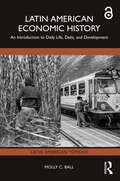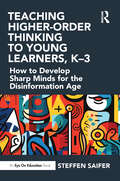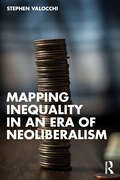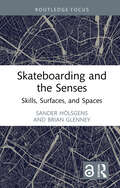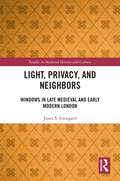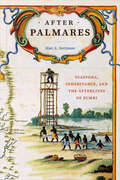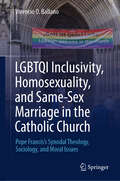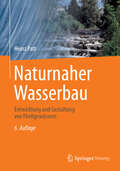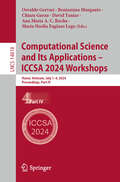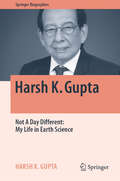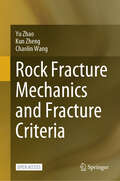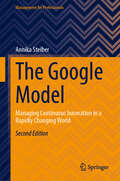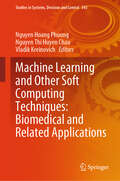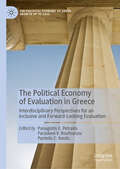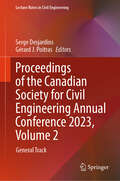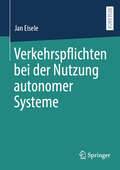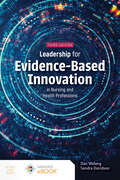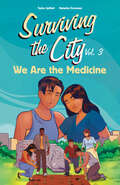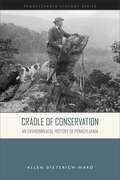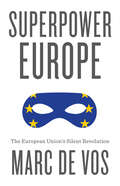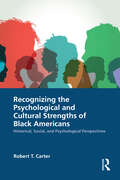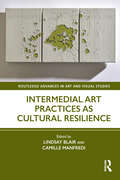- Table View
- List View
Latin American Economic History: An Introduction to Daily Life, Debt, and Development (Latin American Tópicos)
by Molly C. BallLatin American Economic History: An Introduction to Daily Life, Debt, and Development guides readers through significant features and developments in the region’s economic history from independence through 2022.In approachable language, the book introduces readers to relevant New Economic History concepts and explains important characteristics of Latin America, such as the region’s high volatility, rapid urbanization experience, the continued prominence of commodities, and its culture of informality. The volume provides explicit connections between culture, politics, and economics over five distinct time periods. Readers will learn how Cinco de Mayo featured in foreign debt repayments in the nineteenth century, how novels like Gabriel García Márquez’s One Hundred Years of Solitude reflected on the expansion of railroads during a period of export-led growth, and how a United States federal reserve interest hike in 1979 sent the region into the Lost Decade. When considered collectively, the region’s economic trajectory demonstrates that development does not always accompany economic growth.This is an accessible introductory text with clear definitions and discussions of relevant economic concepts, which will be a valuable resource for students of Latin American economic, cultural, and political history.The Open Access version of this book, available at http://www.taylorfrancis.com, has been made available under a Creative Commons Attribution-Non Commercial-No Derivatives (CC-BY-NC-ND) 4.0 license.
Teaching Higher-Order Thinking to Young Learners, K–3: How to Develop Sharp Minds for the Disinformation Age
by Steffen SaiferTo be truly educated today, students need more than knowledge; they need higher-order thinking skills. Critical and creative thinking is required to recognize and counter disinformation, to overcome thinking errors, and to be successful in school and life. To effectively teach these skills, we must start early, when young minds are still forming. While K–3 students are capable of higher-order thinking, most lessons engage only their lower-order thinking. In this comprehensive book based on sound science, Dr. Saifer offers many practical and engaging ways to develop students’ logical, critical, and creative thinking skills within nearly every lesson, in all subject areas, and throughout the day. Teaching Higher-Order Thinking to Young Learners, K–3: How to Develop Sharp Minds for the Disinformation Age is key reading for any early childhood teacher, leader, or parent.
Mapping Inequality in an Era of Neoliberalism
by Stephen ValocchiOffering a unique, comprehensive, and critical introduction to increasingly visible social inequalities, this textbook examines the political and economic causes and cultural consequences of a stratifying system that allocates material resources and human dignity on the basis of private profit and labor exploitation.Mapping Inequality in an Era of Neoliberalism foregrounds capitalism as the major source of the power relations in the United States, as a class system that serves the dominant vector of inequality and sets the parameters of social mobility. The book starts with racialized capitalist power and shows how this power is constituted in structures of opportunity and constraint. It also uses ethnographic accounts to “flip the script” to show how individuals in the class structure construct identities.Providing students with tools for understanding, Valocchi engagingly introduces many of the crucial concepts in this area of sociology – power, opportunity structures, ideology, social and cultural capitals, and intersectional class identities – connecting them as part of a uniquely critical approach.
Skateboarding and the Senses: Skills, Surfaces, and Spaces (Routledge Focus on Sport, Culture and Society)
by Brian Glenney Sander HölsgensThis book presents a new perspective on skateboarding, centred on the senses, skill acquisition, embodiment, and the concept of "city craft".Skateboarding and the Senses traces how skaters use their skilled bodies to bring vitality to contested spaces. Building on sensory anthropology, the book draws connections between the diverse ways skaters move and their boundless drive for social action – from rebellious interventionism to a critical engagement with sportification and the Olympics. Coalescing around skateboarding’s pedagogy of enskilment, the book examines what to make of the skater’s way of sensing the city, of their bruised heels and scabbed elbows and of their sensory attunement to their friends and foes. Grounded in historical, anthropological, and phenomenological theories of body and space, it examines how skaters acquire somatic knowledge and socio-emotional resilience through their sonic and vibratory experience of the city streets. This sensory anthropology of skateboarding reveals new insights into its long arc of subculture, lifestyle, and sport.This is essential reading for anybody with an interest in the sociology, culture or history of sport, urban geographies, sensory studies, or social and cultural anthropology.
UFOs, the Absurd, and the Limit of Anthropological Knowledge: Imagining the Impossible in Chile (Routledge Studies in Anthropology)
by Diana Espírito SantoThis book offers an ethnographic and conceptual analysis of contemporary UFO phenomena, focusing specifically on Chilean ufology and the ufological “absurd”, nonsensical instances for their experiencers in which there is no conceptual way out. It asks how anthropology can come to terms with what is not said, what is not known, what is in the dark, or even with what both “is” and “is not”. The work draws on three years of participant observation with empirical ufologists, amateur sky watchers, and contactees of varying kinds in Chile. The chapters mobilize three main bodies of literature to elucidate the ufological absurd: negative theology, anthropology of play and deceit, and the physics of dark matter. They explore notions of parallax, paradox, and trickster anthropology. The author takes UFO phenomena, specifically the absurd aspects, as a heuristic with which to posit a conversation between domains; a conversation which highlights darknesses, finiteness, and the limits of representation and media in anthropology, one that could perhaps signal the route to a new language. Consideration is given to how not-knowing can be a space of extreme productiveness for the discipline. The argument put forward is that only by doing an anthropology that looks outside of itself for conceptual inspiration can we come to terms with the non-representable, the un-conceptualizable, the fully paradoxical. This innovative book will be of particular interest to scholars of anthropological theory and religion.
Light, Privacy, and Neighbors: Windows in Late Medieval and Early Modern London (ISSN)
by Janet S. LoengardDensity of housing in late medieval and early modern London could make access to light and privacy incompatible, provoking neighbor disputes. This book examines the Custom of London on light, which reflected centuries-old ideas about the right to have, or prevent neighbors from having, windows.The volume explores the background of the Custom and its enforcement by legal action in the Mayor’s Court and by less formal action in the Court of Aldermen, discussing the effect of decisions on the architecture and appearance of the City. It investigates the reasons behind householders’ strongly held feelings about windows, with the need for light and the status evidenced by glazed windows balanced by an insistence on privacy, fear of intruders or accidents, and expense. Over time amendments were made in practice and the Custom survived the Great Fire of 1666, reflecting the continuity of long-held ideas about property rights and acceptable behavior.With both legal and social themes, the book will be of interest to historians, architects, city planners, lawyers curious about the background for modern law on physical privacy, and anyone fascinated by the history of London.
After Palmares: Diaspora, Inheritance, and the Afterlives of Zumbi (Radical Perspectives)
by Marc A HertzmanIn After Palmares, Marc A. Hertzman tells the rise, fall, and afterlives of Palmares, one of history’s largest and longest-lasting maroon societies. Forged during the seventeenth century by formerly enslaved Africans in what would become northeast Brazil, Palmares stood for a century, withstanding sustained attacks from two European powers. In 1695, colonial forces assassinated its most famous leader, Zumbi. Hertzman examines the remarkable ways that Palmares and its inhabitants lived on after Zumbi’s death, creating vivid portraits of those whose lives and voices scholars have often assumed are inaccessible. With an innovative approach to African languages, and paying close attention to place as well as African and diasporic spiritual beliefs, Hertzman reshapes our understanding of Palmares and Zumbi and advances a new framework for studying fugitive slave communities and marronage in the African diaspora.
LGBTQI Inclusivity, Homosexuality, and Same-Sex Marriage in the Catholic Church: Pope Francis’s Synodal Theology, Sociology, and Moral Issues
by Vivencio O BallanoThis book employs an experimental approach to critically re-examine the Catholic Church’s traditional teachings on homosexuality, heterosexual marriage, and Lesbian, Gay, Bisexual, Transgender, Queer, and Intersexual (LGBTQI) inclusivity in light of Pope Francis’s inductive synodal theology and modern sociology. With the growing complexity of today’s culture and the advancement of social science research, it argues that the empirical foundations of the traditional Church’s doctrines on topical moral issues need to be scientifically re-assessed, so as to update them in view of Francis’s synodality and sociological research on gender, sexuality, and same-sex union. Discussion pertaining to whether homosexuality is naturally disordered and whether heterosexuality is the only criterion for Christian marriage remain lingering empirical issues in the Church that require a sociological and inductive synodal analysis, rather than the traditional deductive philosophical and theological method that is largely based on natural law theory. This topical book is of appeal to scholars and students of sociology, theology, as well as religious, biblical, and gender studies.
Naturnaher Wasserbau: Entwicklung und Gestaltung von Fließgewässern
by Heinz PattDieses Fachbuch wurde im Hinblick auf die Neufassungen zahlreicher Umweltgesetze aktualisiert. Zu nennen ist insbesondere die Änderung des Wasserhaushaltsgesetz (WHG). Des Weiteren ist der Stand der Arbeiten im Rahmen der Umsetzung der EG-Wasserrahmenrichtlinie fortgeschrieben. Hierbei sind die Erfahrungen mit den Maßnahmenprogrammen dargestellt. Insgesamt wird ein geschlossenes Bild für Planung und Durchführung naturnaher Maßnahmen an unseren Fließgewässern vorgestellt. Umfassende Hinweise zur aktuellen rechtlichen Situation, zum Planungsablauf und auf neue Aspekte bei der Gewässerunterhaltung sind ebenso enthalten wie hydrologische, hydraulische und sedimentologische Grundlagen. Technik und Ökologie sind in diesem Werk über den naturnahen Wasserbau gleichwertige Partner. Es wendet sich in fachübergreifender Blickweise an die in Wasserwirtschafts- und Naturschutzverwaltungen sowie in Planungsbüros tätigen Ingenieure, Landespfleger und Biologen sowie an alle, die für Ausbau und Unterhaltung von Fließgewässern zuständig oder daran interessiert sind.
Computational Science and Its Applications – ICCSA 2024 Workshops: Hanoi, Vietnam, July 1–4, 2024, Proceedings, Part IV (Lecture Notes in Computer Science #14818)
by Osvaldo Gervasi Beniamino Murgante Ana Maria A. C. Rocha David Taniar Chiara Garau Maria Noelia Faginas LagoThis eleven-volume set LNCS 14815 – 14825 constitutes the refereed workshop proceedings of the 24th International Conference on Computational Science and Its Applications, ICCSA 2024, held at Hanoi, Vietnam, during July 1–4, 2024. The 281 full papers, 17 short papers and 2 PHD showcase papers included in this volume were carefully reviewed and selected from a total of 450 submissions. In addition, the conference consisted of 55 workshops, focusing on very topical issues of importance to science, technology and society: from new mathematical approaches for solving complex computational systems, to information and knowledge in the Internet of Things, new statistical and optimization methods, several Artificial Intelligence approaches, sustainability issues, smart cities and related technologies.
Harsh K. Gupta: Not A Day Different: My Life in Earth Science (Springer Biographies)
by Harsh K. GuptaThis book captures the essence of one of the most remarkable journeys of a professional who prevailed over numerous challenges and adverse situations that appeared before him from nowhere and how he emerged victorious to be hailed at a global forum of the American Geophysical Union in 2008. The author reflects upon the circumstances and times in post-independent India that threw him out of the comforts of a well-to-do family into the real world. He traces back his entry into the field of earthquake science and dwells at length upon the scope and freedom it offered for innovative thinking in the field with limitless opportunities. Mishaps and accidents paved the way to remarkable discoveries and achievements including the creation of the world record for establishing and populating India’s first permanent base station in Antarctica in a record time of one Antarctic summer despite having a near-fatal helicopter crash on 4th day after reaching Antarctica. Stressing the need to live safely with earthquakes as their short-term prediction is not a possibility yet, the author advocates a two-prong strategy of directly looking into the earthquake source region deep inside the earth and developing an earthquake-resilient society, simultaneously. He cites the success story of the Indian Tsunami Early Warning System that is operational in the Indian Ocean, today. The book inspires young professionals with a flair for challenges and a burning desire to achieve results at any cost. This book provides important information in a nutshell about artificial water reservoir triggered earthquakes, India’s building of the Dakshin Gangotri all-weather station in Antarctica, Indian Ocean Tsunami warning set-up, Low-Temperature Thermal Desalination, etc. The main objective of the book is to inspire a generation of young minds through a narration of scientific achievements that did not come easily to him. The aim is to tell them the difference between a reaction and a response to a given situation, the former being impulsive and irrational and the latter responsible and rational.
Rock Fracture Mechanics and Fracture Criteria
by Yu Zhao Kun Zheng Chaolin WangThis open access book delves into the realms of geotechnical engineering and solid mechanics. In order to establish fracture parameters that are both relevant and conducive to safety, the book extensively investigates the fracture mechanical properties of mode I, mode II, and mode III in brittle rock materials. Various fracture testing methods and fracture mechanics theories are employed for a comprehensive examination. To provide a theoretical interpretation of the fracture test results, the book presents detailed derivations of established fracture criteria. Additionally, new fracture criteria are introduced to enhance fracture prediction models. Targeted at graduate students, scientists, and engineers engaged in the study of rock fracture mechanics, hydraulic fracturing, and material mechanics, this book serves as a valuable resource.
The Google Model: Managing Continuous Innovation in a Rapidly Changing World (Management for Professionals)
by Annika SteiberUnlock the strategies and practices that have propelled Google and similar organizations to the forefront of innovation with this essential guide. This book delves into how Google has revolutionized management practices to foster continuous and disruptive innovation in dynamic markets. In this second edition, you'll explore: Six Management Principles: Learn practical applications of these principles in leadership, culture, organizational structure, and people management. Comparisons: Understand the evolution of Google from 2014 to 2023 and see how its management model has adapted to stay ahead. Future-Proof Strategies: Discover why the future belongs to organizations that embrace a new management model designed for the 21st century, using Google's model as a benchmark, as well as, how to transform your organization. This book is not just a theoretical analysis; it's a practical guide for managers and public officials looking to implement sustainable management procedures. Whether scaling a startup or transforming a large organization, you'll find invaluable insights to drive innovation and growth. Additionally, this book serves as an excellent complement to organizations interested in the innovation standard ISO 56001.
Machine Learning and Other Soft Computing Techniques: Biomedical and Related Applications (Studies in Systems, Decision and Control #543)
by Vladik Kreinovich Nguyen Hoang Phuong Nguyen Thi Huyen ChauThis book contains applications to various health-related problems, from designing and maintaining a proper diet to enhancing hygiene to analysis of mammograms and left-right brain activity to treating diseases such as diabetes and drug addictions. Health issues are very important. So naturally whatever new data processing technique appears, researchers try to apply it to health issues as well. From this viewpoint, Artificial Intelligence (AI) and Computational Intelligence (CI) techniques are no exception: they have been successfully applied to medicine, and more promising applications are on the way. Applications of AI and CI techniques to health issues are the main focus of this book. Health issues are also very delicate, because human bodies are complex organisms. No matter how interesting and promising are new ideas and new techniques, there is always a possibility of unexpected side effects. Because of this, we cannot apply untested methods to patients, and we first need to test these methods on other less critical applications. Several book chapters describe such applications—whose success paves the way for these methods to be used in biomedical situations. These applications range from human/face detection to predicting student success to predicting election results to explaining the observed intensity of space light. We hope that this book helps practitioners and researchers to learn more about computational intelligence techniques and their biomedical applications—and to further develop this important research direction.
The Political Economy of Evaluation in Greece: Interdisciplinary Perspectives for an Inclusive and Forward-Looking Evaluation (The Political Economy of Greek Growth up to 2030)
by Panagiotis E. Petrakis Pantelis C. Kostis Paraskevi V. BoufounouThis contributed volume explores the relationships between politics, economics, and evaluation. With a special focus on Greece, it addresses how evaluations within different sectors impact policymaking and explains what this means for sustainable development. Featuring interdisciplinary perspectives on economic policy evaluation for inclusive and future-forward public policy, the chapters rethink and reform evaluation to meet modern economic challenges. The book outlines the concept and principles of resource allocation in evaluation, offering a framework for economic transformation. It highlights the role of evaluation in achieving sustainable development. It provides a new way to measure the quality of public policy, governance, and economic policy.
Proceedings of the Canadian Society for Civil Engineering Annual Conference 2023, Volume 2: General Track (Lecture Notes in Civil Engineering #496)
by Serge Desjardins Gérard J. PoitrasThis book comprises the proceedings of the Annual Conference of the Canadian Society for Civil Engineering 2023. The contents of this volume focus on the general conference with topics on transportation, climate adaptability, sustainable design, green buildings, cold regions, and civil engineering education, among others. This volume will prove a valuable resource for researchers and professionals.
Verkehrspflichten bei der Nutzung autonomer Systeme
by Jan EiseleDas Buch behandelt die Frage nach dem Bestehen von Verkehrspflichten des Nutzers autonomer Systeme. Es geht also um: 1) Autonome Systeme: Das sind besonders selbständige künstliche Intelligenzen. 2) Die Nutzer solcher Systeme: Die Frage der Haftung für künstliche Intelligenz beschränkt sich sowohl in der Wissenschaft als auch beim Gesetzgeber auf den Hersteller. Kontrastierend dazu beschäftigt sich die Arbeit mit der Haftung des Nutzers. 3) Verkehrspflichten: Die Arbeit rekurriert als Anknüpfung für eine mögliche Haftung auf die Verkehrspflichten und dazugehörige Bereiche.
Leadership for Evidence-Based Innovation in Nursing and Health Professions
by Daniel Weberg Sandra DavidsonLeadership for Evidence-Based Innovation in Nursing and Health Professions, Third Edition addresses the core competencies and behaviors required of advanced practice nurses to be innovative leaders. Dr. Weberg and Dr. Davidson thoughtfully revised and updated the third edition with new chapters and content on modern and timely topics, including implementation science as an extension of evidence-based practice, work force constructs and dynamics, building teams, and more. With Leadership for Evidence-Based Innovation in Nursing and Health Professions, Third Edition, advanced practice nursing students will confidently identify and address new and emerging sources of evidence-based practice that can inform, translate and scale the complexity of leading innovation in healthcare organizations.
We Are the Medicine (Surviving the City)
by Tasha SpillettMiikwan and Dez are in their final year of high school. Poised at the edge of the rest of their lives, they have a lot to decide on. Miikwan and her boyfriend, Riel, are preparing for university, but Dez isn&’t sure if that&’s what they want for their future. Grief and anger take precedence over their plans after the remains of 215 children are found at a former residential school in British Columbia. The teens struggle with feelings of helplessness in the face of injustice. Can they find the strength to channel their frustration into action towards a more hopeful future? We Are the Medicine is the moving final volume of the best-selling Surviving the City series.
Kurinji Malar
by Na. ParthasarathyOn a rock on the road to a hill temple are carved the names 'Aravindan' and 'Poorani'. Barely out of her teens, Poorani is plunged into crisis with the sudden passing of her father. As she brings her life back on course, fate arranges a meeting with Aravindan. Gentle and idealistic, Aravindan makes it his goal to right the wrongs in society. Spirited and refined, Poorani blazes a trail to recognition and renown with her public-speaking knowhow. Their friendship soon blossoms into love. But can a world riddled with opportunism and deceit ever hold their dreams and ideals? Written more than six decades ago and set in Madurai and the surrounding areas of the Tamil land, this classic romance - peopled by an array of compelling characters - was first serialized in a magazine in the 1960s, and later attained further popularity on-screen. Believed to be Na. Parthasarathy's magnum opus, Kurinji Malar is a sweeping saga that conjures an unforgettable landscape of hope and heartbreak - a delicate balance only a master storyteller can offer.
Cradle of Conservation: An Environmental History of Pennsylvania (Pennsylvania History)
by Allen Dieterich-WardFrom the origins of “Penn’s Woods” to the controversial practice of fracking, Cradle of Conservation provides the first comprehensive study of Pennsylvania’s environmental history. The story starts with forester Ralph Brock at the dawn of the conservation era and continues through the eras of energy production using coal, oil, natural gas, and other resources. Allen Dieterich-Ward also investigates how the non-human world shapes the history of the commonwealth and examines the impact of pollution. Cradle of Conservation moves across time and place, from the Haudenosaunee people of the Susquehanna Valley, to the iron furnaces of nineteenth-century Pittsburgh, to the diesel trucks on the twentieth-century Pennsylvania Turnpike. In addition, Dieterich-Ward explores the histories of Philadelphia’s Schuylkill River and the state’s anthracite region and traces the environmental movements and crises that have led to public policy changes in the face of climate change. Cradle of Conservation deepens our understanding of how Pennsylvanians have conserved and consumed.
Comfort Sequels The Psychology of Movie Sequels from the ‘80s and ‘90s
by Emily MarinelliIn the late eighties and early nineties, while other kids were playing softball, Emily was sporting a Pink Ladies jacket, perfecting Michelle Pfeiffer' s “ Cool Rider” choreography from Grease 2, and wearing out the VHS player. Comfort Sequels: The Psychology of Movie Sequels from the ‘ 80s and ‘ 90s tells stories from Emily's life, through the movie sequels of their childhood. When a film touches us, makes us deep-belly laugh, and has that feel-good spirit, we want more of it. We want the continuing story. We want the same story even, just recycled and offered in a slightly new way. What felt so good about the original can come back twofold and be the same, but different. Comfort Sequels examines the psychology behind what makes certain movie sequels memorable, safe, predictable, and comforting. These sequels are more of the universe we love— exploring something new while maintaining that which is familiar. Comfort Sequels is a sneaky memoir, celebrating the campiness and nostalgia that these films evoke. Every chapter is a love letter to a specific movie sequel. As a licensed psychotherapist and psychology professor, Emily interprets characters, story arcs, and major themes in a unique voice from a unique perspective while sharing fun and random behind-the-scenes facts about each film.Featuring interviews with Muppeteer Steve Whitmire (creator of Rizzo the Rat from The Great Muppet Caper), Christine Ebersole (My Girl 2), Stuart Pankin (Mannequin 2: On the Move), Peter Mosen (Ghostbusters II), Christopher McDonald and Leif Green (Grease 2), and the “ Cool Rider” himself, Maxwell Caulfield (Michael, also from Grease 2).Comfort Sequels covers the following twelve comfort sequels; Grease 2, Gremlins 2: The New Batch, My Girl 2, Karate Kid: Part II, The Great Muppet Caper, Teenage Mutant Ninja Turtles 2: The Secret of the Ooze, Ghostbusters II, Batman Returns, Dream a Little Dream 2, Mannequin 2: On the Move, The Neverending Story II: The Next Chapter, and The Evening Star.
Superpower Europe: The European Union's Silent Revolution
by Marc De VosThe European Union is in a state of revolution. In response to new global realities from the climate crisis to the Covid-19 pandemic, the war in Ukraine to the emerging cold war with China, the EU is transforming into a federal superpower in a new world order. In this timely intervention, Marc De Vos gets to the heart of the challenges facing the European Union as it undergoes this silent revolution. Charting its changing mission and identity from a European community into a geostrategic coalition of Eurasian countries; from a union of values into a union of power; and from a market project into a state project, he exposes what’s at stake for both the EU itself and its partners across the world. But retaining this new superpower status, he cautions, is not a given. The European Union’s de facto metamorphosis must mature into a democratic political structure or it risks a crisis of legitimacy that could ultimately threaten the stability of the European Union itself.
Recognizing the Psychological and Cultural Strengths of Black Americans: Historical, Social and Psychological Perspectives
by Robert T. CarterThis book examines the cultural beliefs and practices of Black folks in relation to psychological strength.Divided into four parts, the book begins with a discussion on the history of African civilizations, including an analysis of faiths, architecture, and cultural diversity of the continent, followed by a meaningful dialogue on the history of slavery and plantations in North America. The later sections are a study on the contribution of the African American community towards America’s prosperity. The book explores cultural values as a source of power, and uses historical, social, and psychological research to construct a framework of Black cultural values and psychological resolve. The author offers practical applications and interventions to demonstrate how this framework can be applied to training and policy matters on both individual and systemic levels.Recognizing the Psychological and Cultural Strengths of Black Americans is essential reading for students and academics in the fields of Psychology, Sociology, Critical Race Theory, Political Science, and other related disciplines. It will also be a useful resource for professionals including policy makers, psychologist, counsellors, educators, and social workers.
Intermedial Art Practices as Cultural Resilience (Routledge Advances in Art and Visual Studies)
by Lindsay BlairThis innovative collection of essays is focused on the idea of transmedialization: the ways that the traditional forms of the predominantly oral cultures of Scotland and Brittany (poetry, song and story) can be transformed by the use of hybrid forms and new digital technologies.The volume invites readers from a range of disciplines – music, art, literature, history, cultural memory studies, anthropology or media studies – to consider how an intermedial aesthetics of the edge can enable these distinctive cultures to thrive. The languages of both cultures are presently endangered and the essays seek to connect notions of language with a culture which can align its traditions with the concerns of the present day. The collection proceeds from a conceptual analysis of poetry film, peripheral vision and the concerns of peripheral communities to an examination of inventive practices in the film-poem, experimental video, film portrait, word-image, digitised music, sound-image and genre-contestant narratives. The collection also includes contributions from creative practitioners who utilize a range of hybrid forms to revitalize the traditional vernacular cultures of Scotland and Brittany.The book will be of interest to scholars working in art history, literature, film studies, media studies, music, cultural theory, and philosophy.
